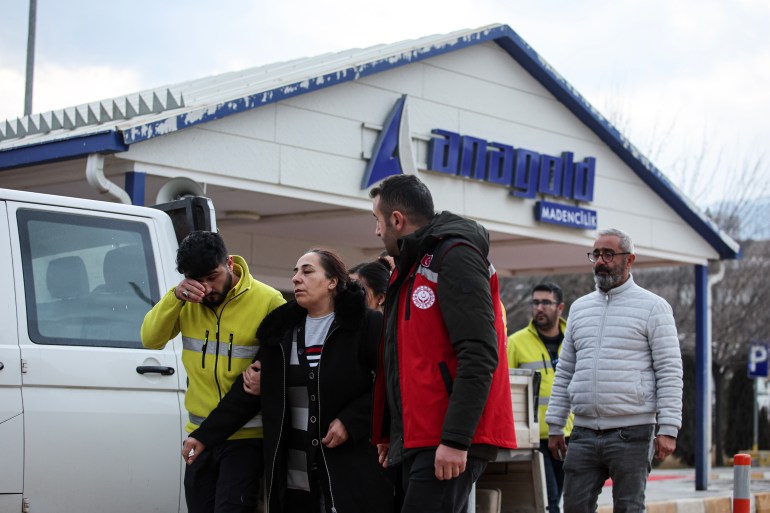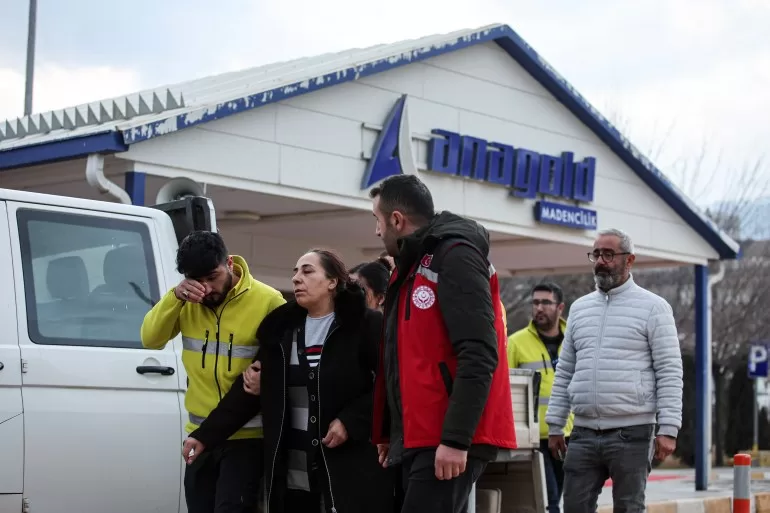Disaster highlights country’s poor safety record, as previous calls to shut down Copler mine went unheeded.
Turkey is under pressure to shut down a gold mine buried by a massive landslide, as hundreds of rescuers battle to save at least nine trapped workers.
The Union of Chambers of Turkish Engineers and Architects said on Wednesday that the government should close the Copler mine in the eastern town of Ilic “immediately”.
The union said its past warnings about a looming disaster had gone unheeded. “All those responsible for the disaster should be held accountable before the judiciary,” it said in a statement. “All environmental impact reports should be cancelled and the plant should be closed immediately.”
Rescuers were deployed to search through cyanide-saturated soil to save the workers, trapped when 10 million cubic metres of sludge rolled over their open pit on Tuesday.
Interior Minister Ali Yerlikaya said on Wednesday that some 1,700 search and rescue personnel, including police and military teams, mine rescuers and volunteers, were deployed to find the mine workers.
Of the nine missing, five people were believed to be in a container hut, three in a vehicle and one in a truck, he said at the disaster site.

An investigation has been launched and the authorities said on Wednesday that four people, including the pit’s field manager, had been arrested.
The mine is run by private company Anagold, which has been extracting gold in the region since 2010. Eighty percent of Anagold is owned by SSR Mining, which is based in Denver in the United States, and Turkey-based Lidya Madencilik and Calik Holding.
The mine produced 56,768 ounces (1,609kg) of gold in the third quarter of last year and is SSR’s second-largest producing gold mine.
Cyanide
Rescuers have been searching through a cyanide-laced field in the area, located in Turkey’s mountainous Erzincan province, to find the workers.
Environmentalists fear that cyanide and sulphuric acid used in the gold extraction process could spread into the Euphrates River, which runs from Turkey to neighbouring Syria and Iraq.
The Ministry of Environment, Urbanisation and Climate Change said in a statement that a stream leading to the Euphrates was closed to prevent water pollution. Erzincan Governor Hamza Aydogdu said there was no leakage into the waterway.
But the Ilic Nature and Environment Platform, a local pressure group, said the stream had already mixed with the Euphrates.
“Don’t seal off [the stream], seal off the mine,” the group said.
Poor safety record
The mine was closed down in 2020 following a cyanide leak caused by a burst pipe into the river. It reopened two years later after the company was fined and a cleanup operation was completed.
A Turkish court then fined the company 16.5 million Turkish lire ($537,000 at the current exchange rate). But local efforts to shut it down failed.
Turkey has a poor mine safety record. In 2022, an explosion at the Amasra coal mine on the Black Sea coast killed 41 workers. The country’s worst mining disaster took place in 2014 at a coal mine in Soma, western Turkey, where 301 people were killed.
In the wake of those incidents, engineers warned that safety risks were frequently ignored and inspections not adequately carried out.
